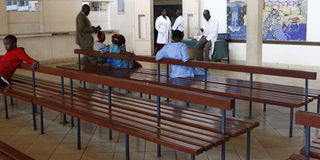Drugs shortage bites public hospitals in Nakuru

Patients at the Nakuru Level Five Hospital. PHOTO | FILE | NATION MEDIA GROUP
What you need to know:
Hospitals in Rongai, Subukia and Naivasha sub counties are the worst hit.
Nakuru health services director Solomon Sirma blamed administrators on the shortage.
Public hospitals in Nakuru County are grappling with a shortage of essential drugs that has lasted for a month now.
Patients seeking services in the public hospitals are advised to buy medications from private facilities.
Residents interviewed by the Nation revealed that some of the essential drugs missing include antibiotics, contraceptives, and painkillers among others.
Hospitals in Rongai, Subukia and Naivasha sub counties are the worst hit.
“I took my eight-month-old baby to hospital after she developed breathing complications, but she was referred to Bahati Sub-County Hospital because there were no drugs at the clinic,” said Ms Beatrice Chelang’at, a Rongai resident.
The shortage has been linked to delays in drugs supplies.
“It is unfortunate poor patients are sent home to purchase drugs after [being given] prescriptions,” said outgoing chairman of Banita Dispensary Peter Juma, adding that sometimes patients cannot access even painkillers.
ADMINISTRATORS
But Nakuru health services director Solomon Sirma blamed administrators on the shortage, saying they do not share crucial information with the county government in a timely manner.
“The administrators are required to place an order that is later handed to pharmacists at the sub county level. It [order] is forwarded to the Kenya Medical Supplies Authority (Kemsa). Nurses manning different hospitals should inform the county to act swiftly whenever there are no drugs. Keeping silent cannot being a solution,” said Dr Sirma.
But the director admitted there has been shortage, that he said is being addressed.
Mr Sirma said the shortage is sometimes caused by delays in releasing of funds.
Earlier this year, a health taskforce headed by Dr James Tuitoek, who is the former Egerton University vice chancellor, accused Kemsa of supplying hospitals in Nakuru with drugs with shorter shelf life.
The Tuitoek-led taskforce also claimed the county’s health workers were involved in theft of drugs, which they sell to private clinics at exorbitant prices.
The report also revealed that most health centres and dispensaries cannot provide health services effectively.
Governor Kinyanjui is banking on the taskforce to revamp the health sector in the county.





